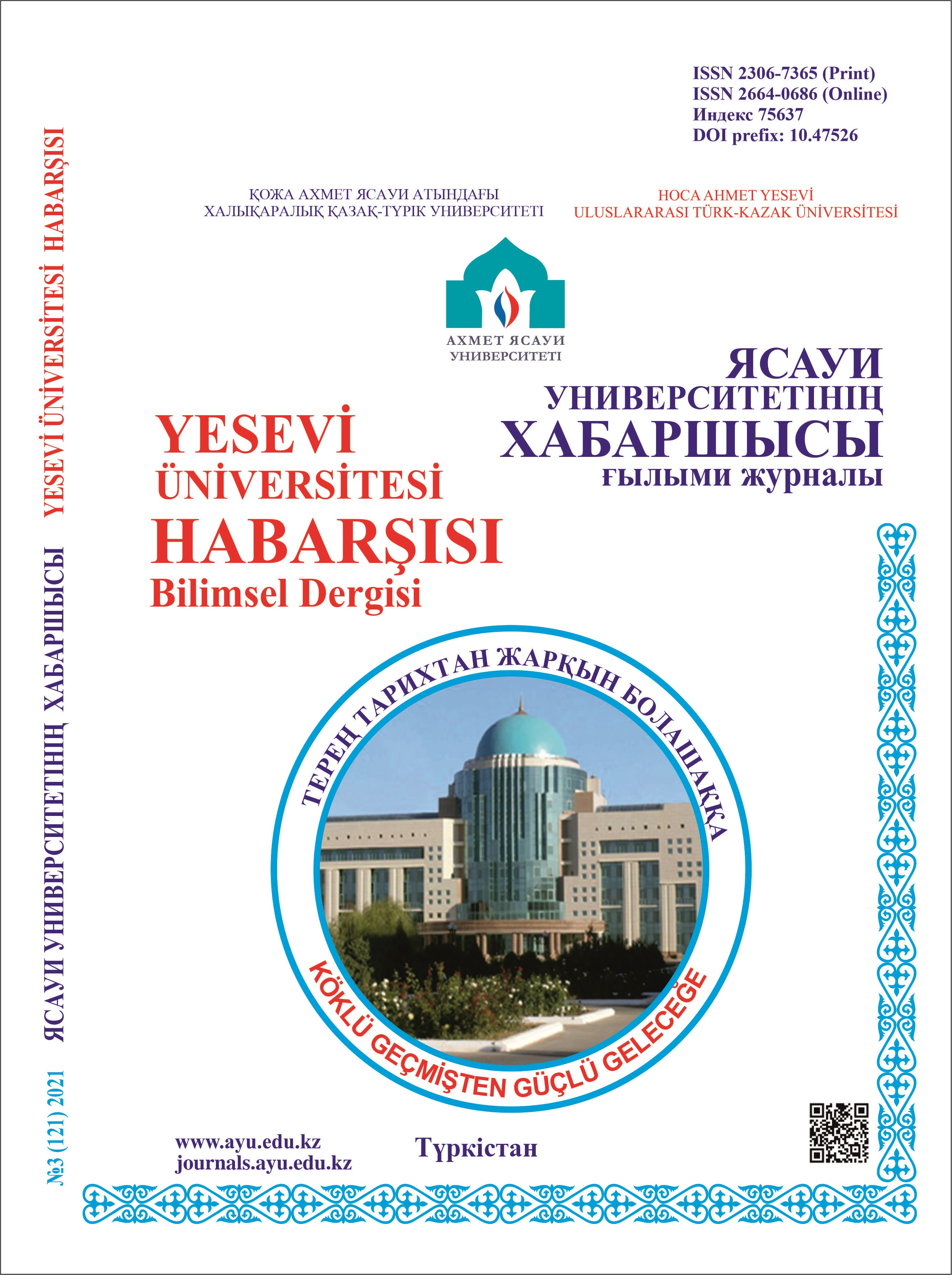Қазақ ертегілеріндегі «жақсылық» пен «жамандық» оппозициясы
223 438
Кілт сөздер:
әдебиет, ертегі, ұлттық сипат, мәдениет, фольклор, оппозиция, ұғым.Аңдатпа
Мақалада қазақ ертегілеріндегі «жақсылық» ұғымы зерделенеді. Халықтың дүниетанымын, мінез-құлқын, жалпы сипатын ашу дегеніміз – әлеуметтік-экономикалық құрылым, өмір сүру салты, болмыс-тіршілігі, өмір сүру жағдаяттары, т.б. жиынтығынан тарихи тұрғыда қалыптасқан ең маңызды әлеуметтік-психологиялық белгілерін айқындау.
Халықтың ұлттық тұрмыс-тіршілігінің қалыптасуына табиғи жағдайлар, өсімдіктер мен жанжануарлар әлемі әсер етіп, өз кезегінде олар айналысатын еңбек түрін, салт-дәстүр мен әдепғұрыптар жүйесін айқындайды. Әлемнің тілдік бейнесі – түрлі тілдік құралдар көмегімен
жүзеге асырылатын ақиқат болмыстың тұтас, жүйелі бейнеленуі.
Мақалада қазақ дүниетанымында қалыптасқан «жақсылық қылсаң – өзің үшін, жамандық қылсаң – өзің үшін» деген тәмсілдің ертегілердегі көрінісі зерттеледі. Бұл халықтың ғұмырлық тәжірибесінен жинақтаған білімінің негізі екені ертегідегі деректер арқылы ғылыми талдауға түседі. Жақсылық пен жамандықты қатар қойып зерделегенде, қай халықтың ертегісін алсақ та жамандық жасап, мұратқа жеткен кейіпкер болмайды. Болмақ емес те. Жақсылық пен жамандық оппозициясы кез келген әлемнің тілдік бейнесінде әр тілде де болатындығы қарастырылады.
Тұрмыс-салт ертегілерінің мәтіндерінде кейде көп нұсқалық та кездеседі. Бұл заңды да, өйткені ауызша айтылатын ертегілердің әр алуан нұсқада келуі заңды. Сонымен бірге сөйлеуде, айтуда икемді болуы, оңай қабылдануы маңызды фактордың бірі.
Қазақ ертегілеріндегі әлемнің тілдік бейнесінде бүгін де өзекті саналатын жақсылық пен жамандықтың айырмашылығы мен оның тұрмыстағы қарапайым көріністері арқылы айқындалатыны түсінікті де нақты деректер арқылы оңай суреттеледі.
Әдебиеттер тізімі
Гумбольдт В. Язык и философия культуры. – М.: Прогресс, 1985. – 452 с.
Ахмет Байтұрсынұлының тілтанымдық мұрасы / құраст. О. Жұбаева. – Астана: Алаш Орда,
– 752 б.
Қасымбекова А.Т. Ертегілердегі ғаламның концептуалды бейнесі (қазақ және ағылшын тілдері
бойынша): Филоcофия докторы (PhD) ... диcc. / Aбaй aтындaғы Қaзaқ ұлттық педaгогикaлық
универcитеті. – Алматы, 2020. – 140 б.
Рыспаева Д.С. Языковая репрезентация концепта «ақыл/ум» в картине мира казахского народа //
Известия КазУМОиМЯ имени Абылай хана серия «Филологические науки». – 2022. – №1(64). –
С. 181–198. [https://bulletin-philology.ablaikhan.kz].
Мәмет С. «Қазақ ертегілері (қиял-ғажайып және тұрмыс-салт ертегілері). – Алматы: Балауса,
– 262 б.
Нұрмағамбетова Ә. Бес жүз бес сөз. – Алматы: Рауан, 2014. – 556 б.
Салқынбай А. Әлемнің когнитивтік бейнесі: қазақ тіліндегі ұлттық кодтар: монография. –
Aлмaты: Қaзaқ университеті, 2020. – 280 б.
Горбачева О.Г. Ономастическое пространство русских народных и авторских сказок: автореф. ...
канд. филол. наук. – М.: Орел, 2008. – 23 с.
Қазақ әдеби тілінің сөздігі. Он бес томдық. 12-том / Құраст. А. Үдербаев, О. Нақысбеков,
Ж. Қоңыратбаева және т.б. – Алматы: Қазақ энциклопедиясы, 2010. – 752 б.
Де Соссюр Ф. Труды по языкознанию / пер. с франц. А.А. Холодовича. – М.: Прогресс, 1977. –
с.
REFERENCES
Gumboldt V. Iazyk i filosofia kultury [Language and philosophy of culture]. – M.: Progres, 1985. –
s. [in Russian]
Ahmet Baitursynulynyn tiltanymdyq murasy [The linguistic heritage of Akhmet Baitursynov] / qurast.
O. Jubaeva. – Astana: Alaş Orda, 2017. – 752 s. [in Kazakh]
Qasymbekova A.T. Ertegilerdegi galamnyn konceptualdy beinesı (qazaq jane agylshyn tilderi boiynsha)
[Conceptual image of the universe in fairy tales (in Kazakh and English)]: Filocofia doktory (PhD) …
diss. / Abai atyndagy Qazaq ulttyq pedagogikalyq universiteti. – Almaty, 2020. – 140 b. [in Kazakh]
Ryspaeva D.S. Iazykovaia reprezentacia koncepta «aqyl/um» v kartine mira kazahskogo naroda
[Linguistic representation of the concept of “akyl/um” in the picture of the world of the Kazakh
people] // Izvestia KazUMOiMIa imeni Abylai hana seria «Filologicheskie nauki». – 2022. – №1(64). –
S. 181–198. [https://bulletin-philology.ablaikhan.kz]. [in Russian]
Mamet S. Kazakh ertegileri (qial-gajaiyp jane turmys-salt ertegileri [Kazakh fairy tales (fairy tales of
fantasy and life)]. – Almaty: Balausa, 2018. – 262 b. [in Kazakh]
Nurmagambetova A. Bes juz bes soz [Five Hundred and five words]. – Almaty: Rauan, 2014. – 556 b.
[in Kazakh]
Salqynbai A. Alemnin kognitivtık beinesi: qazaq tilindegi ulttyq kodtar [Cognitive picture of the world:
national codes in the Kazakh language]: monografia. – Almaty: Qazaq universiteti, 2020. – 280 b. [in
Kazakh]
Gorbacheva O.G. Onomasticheskoe prostranstvo ruskih narodnyh i avtorskih skazok [Onomastic space
of Russian folk and author's fairy tales]: avtoref. … kand. filol. nauk. – M.: Orel, 2008. – 23 s. [in
Russian]
Qazaq adebi tilinin sozdigi. On bes tomdyq. 12-tom [Dictionary of the Kazakh literary language. Fifteen
volumes. Volume 12] / Qurast. A. Uderbaev, O. Naqysbekov, J. Qonyratbaeva jane t.b. – Almaty: Qazaq enciklopediasy, 2010. – 752 b. [in Kazakh]
De Sossur F. Trudy po iazykoznaniu [Works on linguistics] / per. s franc. A.A. Holodovicha. – M.:
Progres, 1977. – 696 s. [in Russian]

